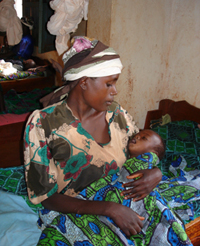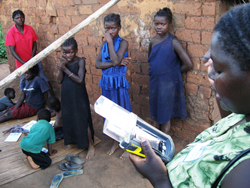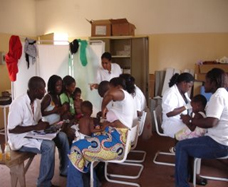President's Malaria Initiative (PMI)
The President's Malaria Initiative
The President's Malaria Initiative (PMI) is a U.S. Government initiative designed to cut malaria deaths in half in target countries in sub-Saharan Africa. It was announced on June 30, 2005, when President Bush pledged to increase U.S. funding of malaria prevention and treatment in sub-Saharan Africa by more than $1.2 billion over 5 years (FY2006-FY2010).
In 2008, the Lantos-Hyde Act authorized an expanded U.S. Government malaria program for FY2009–FY2013. With the launch of the Global Health Initiative and a congressional authorization of extended funding, an expanded USG Malaria Strategy (2009–2014) was developed to achieve Africa-wide impact by halving the burden of malaria in 70 percent of at-risk populations in sub-Saharan Africa, or approximately 450 million people. The Global Health Initiative, announced by President Obama in May 2009, includes PMI and other U.S. global health programs in approximately 80 countries worldwide.
PMI's Partners
PMI works in partnership with host country governments in Africa and builds on existing national programs. PMI is led by the U.S. Agency for International Development (USAID) and is implemented jointly by USAID and CDC. These and other government agencies work with the Global Fund to Fight AIDS, TB, and Malaria; the World Bank; Roll Back Malaria; UNICEF; and other organizations in supporting host countries' malaria control efforts.
PMI collaborates with these governments and agencies to conduct country needs assessments, develop annual Malaria Operational Plans, participate in national malaria partner coordination mechanisms, and complement and expand on monitoring and evaluation strategies.
PMI also works with nongovernmental organizations (NGOs), including faith-based and community groups, academia, and the private sector.
PMI's Interventions
To reduce malaria deaths by half in each target country, PMI helps national governments deliver proven, effective interventions to a majority (85%) of people at greatest risk—pregnant women and children less than 5 years old.

Mother cradling sick child in her arms, Tanzania. (Courtesy UNHCR Malaria Team)
PMI works to scale up access to and use of four interventions:
- Long-lasting insecticide-treated nets
- Artemisinin-based combination therapies (ACTs)
- Intermittent preventive treatment for pregnant women.
- Indoor residual spraying with approved insecticide, where appropriate.
To help deliver these interventions and make sure they are having the desired impact, PMI also focuses on
- Strengthening infrastructure (including logistics, management, communication, training)
- Providing commodities (including antimalarial drugs, rapid diagnostic tests, insecticide-treated nets, and appropriate insecticides for residual spraying)
- Fostering private sector participation
- Conducting rigorous monitoring and evaluation to demonstrate results of PMI inputs and ensuring effective delivery of interventions.
Target Countries and Region
PMI is at work in 19 countries in sub-Saharan Africa and in one region in Asia—the Greater Mekong Subregion, which includes Burma, Cambodia, China (Yunnan Province), Lao People's Democratic Republic, Thailand, and Vietnam.
PMI target countries in Africa:
- Angola
- Benin
- Democratic Republic of Congo
- Ethiopia
- Ghana
- Guinea
- Kenya
- Liberia
- Madagascar
- Malawi
- Mali
- Mozambique
- Nigeria
- Rwanda
- Senegal
- Tanzania
- Uganda
- Zambia
- Zimbabwe

The first day of training of spray teams in Ondjiva, capital of Cunene Province, Angola. (Courtesy RTI and USAID)

Ms. Virginia Taona of the Mozambican Red Cross uses a PDA equipped with a GPS in a survey of insecticide-treated bed nets in rural Mozambique, February 2006. (Courtesy Ramesh Krishnamurthy)

As part of a PMI operational research study led by CDC, health workers test children with fever for malaria in a busy clinic in Luanda, the capital of Angola. The very low prevalence of malaria found in the city allowed the National Malaria Control Program and PMI to focus malaria resources on rural areas where the rates of malaria infection are higher. Credit: Julie Thwing, CDC
CDC's Contributions to PMI
For more than 60 years, CDC has provided scientific leadership in the public health efforts to fight malaria, increasing global understanding and capacity to prevent death and illness from malaria, especially among those most vulnerable – women and children. CDC science has also made critical contributions to our understanding of the impact of drug resistance and ways to prevent its spread.
CDC has contributed to the development and evaluation of the four interventions recommended by the World Health Organization, now being used in efforts to control malaria worldwide: ITNs, ACTs, IPTp, and IRS. PMI's focus is to scale up access to and use of this effective package.
In addition, CDC has long worked closely with National Malaria Control Programs to build their technical leadership and capacity to implement effective prevention and control. Through PMI, it continues this work, by sharing its technical expertise, particularly in the following areas:
- Design and implementation of monitoring & evaluation
- Surveillance of malaria
- Operational research
- Case management (including diagnostics)
- Entomology/vector control
- Laboratory support
CDC's Congressional Mandate in Support of PMI
CDC is charged by U.S. Congress (through the Lantos/Hyde Act, 2008) to take a leadership position in strategic information (monitoring and evaluation, surveillance, operations research)—advising the U.S. Malaria Coordinator on priorities for strategic information activities and being a key implementer of such activities. To ensure that limited resources are being used wisely, CDC helps countries and the U.S. Government target appropriate malaria prevention efforts and understand the impact of PMI activities and interventions.
To find out more about PMI, visit the PMI web site.
Get email updates about Malaria
To receive email updates about this page, enter your email address:
Contact Us:
- Centers for Disease Control and Prevention
1600 Clifton Rd
MS A-06
Atlanta, GA 30333 - Health care providers needing assistance with diagnosis or management of suspected cases of malaria should call the CDC Malaria Hotline:
770-488-7788 or 855-856-4713 toll-free
(M-F, 9am-5pm, eastern time). - Emergency consultation after hours, call:
770-488-7100
and request to speak with a CDC Malaria Branch clinician. - malaria@cdc.gov


